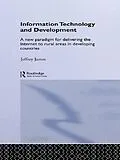Attempts to bring the benefits of information technology in the form of the internet to developing countries have, to date, foundered on the belief that this requires the beneficiaries to access the technology directly. As a result, the perceived huge benefits of such an enterprise have often failed to materialise.This original contribution to the
Autorentext
Jeffrey James is Professor of Development Economics at the University of Tilburg, the Netherlands.
Inhalt
1. IntroductionPart One: Analytical Foundations of a New Paradigm 2. The Existing Paradigm and its Limitations3. An Emerging ParadigmPart Two: Radios, Telephones and Internet Access 4. Community Radio and the Internet5. Basic Telephony and the Internet in Rural AreasPart Three: Rural Internet Access: Alternatives to Radios and Telephones 6. The Need for Alternatives7. The Role of Rural Internet Kiosks: Gyandoot8. The Role of Rural Internet Kiosks: n-Logue
